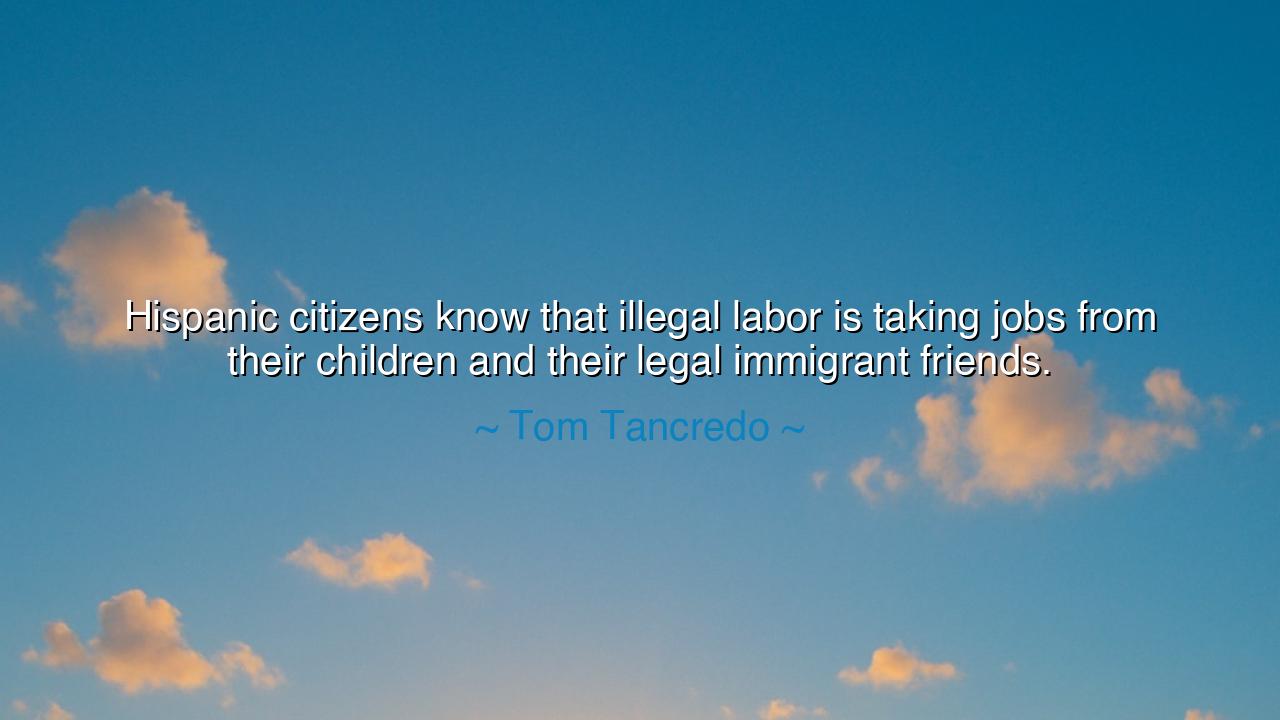
Hispanic citizens know that illegal labor is taking jobs from
Hispanic citizens know that illegal labor is taking jobs from their children and their legal immigrant friends.






The words of Tom Tancredo, “Hispanic citizens know that illegal labor is taking jobs from their children and their legal immigrant friends,” ring with the tension of an age-old struggle — the conflict between justice and survival, between the rule of law and the cries of the desperate. In this statement lies not hatred, but warning — a recognition that when order gives way to chaos, even the innocent are made to suffer. Tancredo speaks to a truth buried beneath politics and passion: that unregulated labor, however well-intentioned, can wound the very communities it claims to represent. For when the law is broken often enough, it ceases to protect anyone — not the citizen, not the worker, not even the dreamer who crosses the border in hope.
Since the dawn of civilization, every nation that rose upon the labor of its people faced the question of who belongs within its walls and who must enter by its gates. The Egyptians guarded their grain; the Romans guarded their citizenship; the Chinese their Great Wall. Each understood that a people’s strength comes not merely from compassion, but from order — from the balance between mercy and discipline. Yet, in every age, there were those who entered in hunger and those who received them in fear. Thus, the story of humanity’s migrations is also the story of its conflicts, its laws, and its fragile attempts at justice. Tancredo’s words call us to remember this — that without structure, compassion itself can collapse under its own weight.
There is both pain and paradox in his quote. For it is not the rich who often feel the sharp edge of illegal labor, but the poor — those whose livelihoods rest upon the same fields, factories, and hands. The Hispanic citizens he speaks of are not distant from the immigrant experience; they are its children. Many know well the sacrifice of leaving one homeland for another. They honor the journey of their legal immigrant friends, who followed the long path of paperwork, patience, and law. Yet they also see their sons and daughters passed over for work, their wages lowered, and their efforts devalued. It is a bitter truth, that one branch of a great tree may shade another from the sun — not by malice, but by the natural consequence of imbalance.
Consider the story of Cesar Chavez, the great champion of farmworkers in America. Himself the son of Mexican immigrants, Chavez stood not against immigrants, but against exploitation — the kind that thrives when laws are ignored and human labor is treated as disposable. He understood that when workers are hired in the shadows, they are paid in shadows — without protection, without dignity, without voice. His fight for fair wages and safe conditions was not only a struggle for the laborer, but for the integrity of the system itself. For if some must suffer in silence, all are diminished. Tancredo’s warning, though spoken in another tone, echoes this ancient truth: that justice must govern compassion, lest the strong exploit both the weak and the well-meaning.
Yet the quote also reveals a deeper sorrow — that division grows easily among those who should be united. The children of immigrants, now citizens, may look upon those who come after them with both empathy and weariness. They remember their own parents’ toil, yet fear that their children’s hopes will wither beneath an unbalanced system. It is not hatred that drives their concern, but a yearning for fairness — for a land where effort is honored and laws mean what they promise. When laws fail, people turn upon each other; but when laws are just and strong, they become the common ground on which all can stand.
Thus, the teaching of Tom Tancredo must not be dismissed as mere politics, but read as a call for order with conscience. He reminds us that to build a society that endures, one must balance compassion for the stranger with loyalty to the citizen; to uphold the law while never losing sight of the human heart. A nation that abandons enforcement loses integrity; a nation that abandons empathy loses its soul. The wise path, as the ancients knew, lies between — in fair governance, in honest labor, and in the unwavering defense of justice that serves all.
Let this truth be passed down as counsel to the generations: work with mercy, but live with principle. Support those who seek a better life, but demand that it be sought through right means. Let your compassion not be blind, but guided by wisdom. For the strength of a people lies not in their numbers, but in their unity — not in how loudly they shout, but in how faithfully they uphold the covenant of law and fairness. In this way, both the citizen and the newcomer may find not rivalry, but harmony — not resentment, but shared dignity under the same sun.






AAdministratorAdministrator
Welcome, honored guests. Please leave a comment, we will respond soon